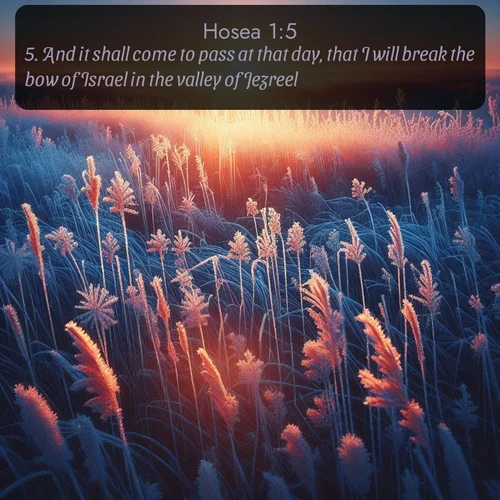Hosea 1:5 plusieurs versions / traductions
English Bible Translations
5. And it shall come to pass at that day, that I will break the bow of Israel in the valley of Jezreel.
5. And it shall come to pass at that day, that I will break the bow of Israel in the valley of Jezreel.
5. And in that day I will let the bow of Israel be broken in the valley of Jezreel.
5. And it shall come to pass in that day, that I will break the bow of Israel in the valley of Jizreel.
5. And it shall come to pass at that day, that I will break the bow of Israel in the valley of Jezreel.
5. and it hath come to pass in that day that I have broken the bow of Israel, in the valley of Jezreel.'
German Bible Translations
French Bible Translations
5. et il arrivera, en ce jour-là, que je briserai l'arc d'Israël dans la vallée de Jizreël.
5. Et il arrivera qu'en ce jour-là je romprai l'arc d'Israël dans la vallée de Jizréhel.
5. Et il arrivera qu'en ce jour je romprai l'arc d'Israël dans la vallée de Jizréel.
Versions with Strong Codes
Hosea 1 / KJV_Strong5. And it shall come to pass[H1961] at that[H1931] day,[H3117] that I will break[H7665] [H853] the bow[H7198] of Israel[H3478] in the valley[H6010] of Jezreel.[H3157]
Strong Code definitions
H1961 hayah haw-yaw a primitive root (compare 1933); to exist, i.e. be or become, come to pass (always emphatic, and not a mere copula or auxiliary):--beacon, X altogether, be(-come), accomplished, committed, like), break, cause, come (to pass), do, faint, fall, + follow, happen, X have, last, pertain, quit(one-)self, require, X use. see H1933
H1931 huw' hoo of which the feminine (beyond the Pentateuch) is hiyw {he}; a primitive word, the third person pronoun singular, he (she or it); only expressed when emphatic or without a verb; also (intensively) self, or (especially with the article) the same; sometimes (as demonstrative) this or that; occasionally (instead of copula) as or are:--he, as for her, him(-self),it, the same, she (herself), such, that (...it), these, they, this, those, which (is), who.
H3117 yowm yome from an unused root meaning to be hot; a day (as the warm hours), whether literal (from sunrise to sunset, or from one sunset to the next), or figurative (a space of time defined by an associated term), (often used adverb):--age, + always, + chronicals, continually(-ance), daily, ((birth-), each, to)day, (now a, two) days (agone), + elder, X end, + evening, + (for) ever(-lasting, -more), X full, life, as (so) long as(... live), (even) now, + old, + outlived, + perpetually, presently, + remaineth, X required, season, X since, space, then, (process of) time, + as at other times, + in trouble, weather, (as) when, (a, the, within a) while (that), X whole (+ age), (full) year(-ly), + younger.
H7665 shabar shaw-bar' a primitive root; to burst (literally or figuratively):--break (down, off, in pieces, up),broken((-hearted)), bring to the birth, crush, destroy, hurt, quench, X quite, tear, view (by mistake for H7663).see H7663
H853 'eth ayth apparent contracted from H226 in the demonstrative sense of entity; properly, self (but generally used to point out more definitely the object of a verb or preposition, even or namely):--(as such unrepresented in English). see H226
H7198 qesheth keh'-sheth from H7185 in the original sense (of H6983) of bending: a bow, for shooting (hence, figuratively, strength) or the iris:--X arch(-er), + arrow, bow((-man, -shot)).see H7185 see H6983
H3478 Yisra'el yis-raw-ale' from H8280 and 410; he will rule as God; Jisrael, a symbolical name of Jacob; also (typically) of his posterity:--Israel.see H8280 see H410
H6010 `emeq ay'-mek from H6009; a vale (i.e. broad depression):--dale, vale,valley (often used as a part of proper names). See also 1025. see H6009see H1025
H3157 Yizr`e'l yiz-reh-ale' from H2232 and 410; God will sow; Jizreel, the name of two places in Palestine and of two Israelites:--Jezreel.see H2232 see H410
Prédications qui analysent les thèmes Osée 1
Thèmes : Appel à Israël; L'amour de Dieu; La promesse de rédemptionRelated Sermons discussing Hosea 1
Themes : Appel à Israël; L'amour de Dieu; La promesse de rédemptionsee also: Bible Key Verses ; KJV Bible Images, BBE Bible images

